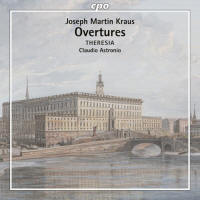Texte paru dans: / Appeared in: |
|
|
|
|
|
Today he is best known for his symphonies (wonderfully recorded by Concerto Köln in the early 1990s), which reveal a strong creative personality allied to a sound command of the medium. His Mannheim apprenticeship shows in a tendency to let the music’s momentum be driven more by orchestral textures than by melodic discourse, but his ability to create a sense of brooding atmosphere through rich and weighty harmonies, sombre wind colourings and eloquent use of Sturm und Drang techniques is outstanding.
No doubt this is what Gluck was talking about, and it is certainly a quality useful to an opera composer, especially if, like Kraus, you are a Gluckist keen to use the overture to anticipate the mood and events of the forthcoming drama. Kraus’s operatic output has yet to be explored in depth on record, but this selection offers intriguing hints of what might lie within. The greatest gravity predictably resides in the overtures to the two parts of his Funeral Cantata for Gustav III, the strings and bassoons of the first articulating a numbed grief that tries but fails to raise its head in stern unisons and a truncated fugue, the second’s dissonances and attempted consolations ultimately sounding scarcely less defeated. But there is also music of great moment in the overtures to Olympie and to the Prologue and Acts 1 and 5 of his masterpiece Aeneas i Cartago, in whose ominous tone and descriptive energy you can hear Romanticism just round the corner. Things are more upbeat in the overtures to the ballet Fiskarena and the comedies Äfventyraren and Soliman II (the latter with predictable but nonetheless rousing Turkish percussion), though they fall short of Mozartian levels of zip and joy.
The performances by Theresia, a Classical-period training orchestra along the lines of the European Union Baroque Orchestra, may fall a little short in clarity, attack and core strength but they are reassuringly stylish under Claudio Astronio. Well worth a rummage. |
|




